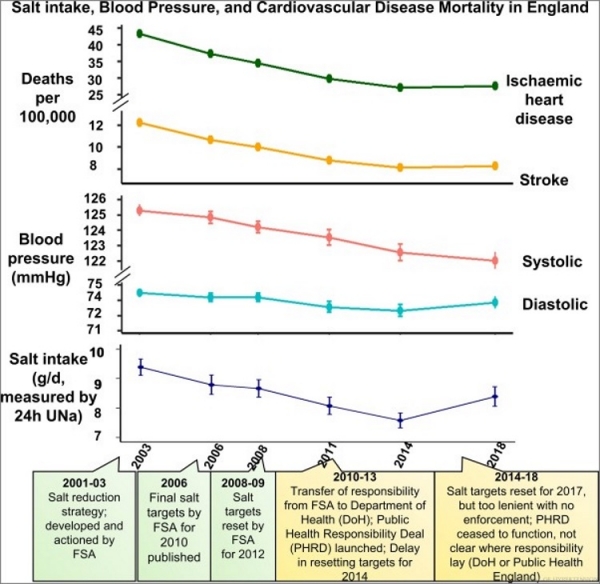Action on Salt denunciates UK government for failing consumers

At the height of its success (2003-2014), the UK salt reduction programme led to a 19% reduction in salt intakes, which had the potential to save more than 9,000 lives a year.
Cardiovascular disease (CVD) - such as stroke and ischaemic heart disease (IHD) - is the leading cause of death and disability worldwide, and responsible for a quarter of all deaths in the UK. While this is can be caused by high blood cholesterol, being overweight or obese, having diabetes, being physically inactive or smoking, a raised blood pressure (BP) is accountable for more than 50% of CVD cases.
A growing body of research confirms that BP is regulated by dietary salt intake, meaning, the lower the salt intake, the lower the BP. In fact, the World Health Organization (WHO) recommends salt reduction as one of the ‘Best Buys’ to reduce the risk of CVD.
In 2003, the Food Standards Agency (FSA) - in consultation with industry representatives from health professionals to consumer groups - initiated a salt reduction programme in the UK. The voluntary salt targets focused on 85 categories of processed and prepared foods in 2006, which contributed to over 75% of daily salt intake in the UK.
The mean salt content of the majority of the targeted food categories was reduced by 20% or more between 2003 and 2011, contributing to reduction of salt intake from 9.5g/day to 8.1g/day. This reduction was estimated to have led to a 3mmHg reduction in BP, which in turn contributed to the reduction in stroke and IHD mortality during that period - estimated to have led to healthcare savings of £1.5bn per year.
However, the effectiveness of the ‘once world-class’ salt reduction programme has been questioned, following the transfer of responsibility for nutrition policy from the FSA to Department of Health, which then handed power to the food industry to police themselves through the failed Public Health Responsibility Deal (PHRD).
To analyse the success of the programme between 2003 and 2018 - more specifically to find out what has happened since 2014 - researchers from the Queen Mary of University of London analysed publicly available data to evaluate the nation’s salt intake against instances of high blood pressure (BP) and adult deaths from heart disease and stroke.
The study - published in the Journal of Hypertension - revealed that although the average salt intake, BP and deaths initially continued to decline, this has since plateaued or even increased.
Salt intake:
- From 2003 to 2014: A decline from 9.38g/day to 7.58g/day.
- By 2018: An increase to 8.39g/day.
BP:
- From 2003 to 2014: A decline from 125.3/74.5 mmHg to 122.6/73.3 mmHg.
- By 2018: A plateau of 122.0/73.8 mmHg.
Stroke and heart disease mortality rates:
- From 2003 to 2014: A decrease from 12.2 (stroke) and 43.4 (heart) deaths per 100,000 to 8.2 and 27.2 deaths per 100,000.
- By 2018: A plateau.
These findings confirm the importance of salt reduction to improved health. It also shows that when managed correctly, a salt reduction programme has the potential to save thousands of citizens from premature deaths caused by strokes and heart disease.
“Reducing salt intake has been identified by the World Health Organisation (WHO) as one of the most cost-effective measures to improve population health,” said Jing Song, postdoctoral research assistant at the Queen Mary University of London and lead author of the analysis.
“As a nation, if we cut one gram of salt from our average daily salt intake, this could save over 6,000 lives every year from strokes and heart disease - all of which are completely avoidable - and save the economy £1.5 billion annually.”
Putting responsibility back in the hands of the Government
The lack of progress since 2014 - which coincides with responsibility for the salt reduction programme being handed to the food industry - indicates that its effectiveness has been compromised, said Action on Salt.
According to the analysis, if the programme had been maintained, the UK’s salt intake between 2014 and 2018 could have been reduced by a further 1.45 g/day. This would have prevented over 38,000 deaths from strokes and heart disease during that period, of which 24,000 were premature.
These results underscore the findings from a recent Action on Salt consumer poll, which showed 90% of the UK population would support the Government in taking more action to protect the public’s health, while nearly 80% think the onus lies on the shoulders of ministers.
85% of the respondents still believe it’s the responsibility of the food industry to reduce unnecessary salt in their products.
Urgent resuscitation required
Action on Salt - together with 33 health experts and health charities - is now calling on party leaders to prioritise salt reduction through a mandatory and comprehensive programme.
“This study reinforces the urgent need for a robust system where we generate worthwhile reductions in salt intake that make a positive and lasting impact,” said Prof Graham MacGregor, professor of Cardiovascular Medicine at Queen Mary University of London, chairman of Action on Salt and co-author of the analysis.
“It is now up to the Government to set up a coherent strategy where the food industry is instructed what to do, rather than the food industry telling the Government what to do. We must get our salt reduction strategy back on track for the benefit of public health, the UK workforce, our overburdened NHS and the economy.”
Sonia Pombo, Action on Salt campaign lead and co-author of the study, maintains the once-successful salt reduction programme is a shell of its former self.
“Salt reduction is simple and easy to implement, and this research confirms it works,” she said, adding “the UK’s downfall was trusting the food industry to deliver reductions in salt content without an incentive to do so or enforcement from the Government.
“Urgent resuscitation in the programme is needed if we are to get back on track and save the most lives.”
Level the playing field
Other voices echo Action on Salt’s stance that food companies, alone, cannot match the scale and pace needed to deliver a healthier nation without Government help to level the playing field.
“It should be easy to eat healthily, but it’s not. The public wants it to be easier, and overwhelmingly supports action from government to require companies to reduce salt in their food,” said Katharine Jenner, director of the Obesity Health Alliance.
While the Queen Mary University analysis was specifically focused on the health and prevention of premature deaths of UK adults, a targeted salt reduction programme could also have a significant impact on the health of the nation’s youth.
“In the early years, it’s important to expose children to a wide range of tastes to develop their preferences that they’ll take into their adult years,” said Edwina Revel, programme director for Early Start Nutrition.
“It’s essential that babies and toddlers don’t develop a taste preference for salty foods as they’re more likely to eat salty foods as they grow up. A high salt diet can result in children developing high blood pressure.
“The higher the blood pressure in childhood, the higher it will be in adulthood, increasing their risk of heart disease in later life. As babies and toddlers take part in family meals, they’re exposed to higher than recommended salt levels.
“Food quality matters for our youngest generation and we support Action on Salt in calling for both mandatory salt reduction targets and the introduction of a reinvigorated programme in the UK to prioritise salt reduction.”
Added Barbara Crowther, Children’s Food campaign manager for Sustain, said: “This is yet more evidence that without a proper Government mandatory framework providing the incentive, progress towards healthier food is not going to be achieved.
“We’ve seen with the Soft Drinks Industry Levy how effective it can be when they do. Now Government needs similar ambitions to push companies harder to change the recipe on salty food. Doing so would protect the nation from a range of health conditions and support a healthier nation and economy.”
The impact of reformulation: producer’s nightmare or brand boost?
The food industry - the bakery and snacks sectors in particular - are very aware of the need to reduce the sodium, sugar and unhealthy fats content in their products and working hard to do so, with the support of Government bodies like Food Standards Scotland and associations like Scottish Bakers, among others.
Although reformulation, in simple terms, is the process making changes to recipes to adjust ‘harmful’ ingredients, decreasing or eliminating additions like salt will alter the composition of a product or means changing processing procedures.
One of the biggest challenges, too, is to do produce a better-for-you product that doesn’t compromise on the tastes and textures that consumer’s know and love.
Bakery&Snacks will be taking a deep dive into the complex challenges of Reformulation in a free-to-attend webinar on Thursday, 28 September 2022 at 3:00 BST/4pm CET/9am CT.
Industry leaders take the podium to discuss the movement that is increasingly impacting all areas when it comes to creating standout snacks, from trickier better-for-you formulations that don’t negate on indulgence, to simpler labels and being as good for the planet as they are for the body.
For 60+ intensive minutes, participants will be privy to the vast reserves of insights from our expect panellists, including:
- Laura Wilson, head of Public Health Nutrition, Food Standards Scotland (FSS)
- Katy Askew, MD, IFIS Publishing
- Mike Hughes, head of Research & Insight, FMCG Gurus
- Stella Kim, food developer, Naturebox / HUNGRY
If you can’t make the live event, register anyway. The webinar will be made available to registrants after the broadcast date as an on-demand presentation.
Studies:
Salt reduction in the United Kingdom: a successful experiment in public health
Authors: F J He, H C Brinsden, G A MacGregor
J Hum Hypertens. 2014 Jun;28(6):345-52
doi: 10.1038/jhh.2013
Salt intake, blood pressure and cardiovascular disease mortality in England, 2003-2018
Authors: Song, Jing; Tan, Monique; Wang, Changqiong; et al
Journal of Hypertension ():10.1097/HJH.0000000000003521, August 24, 2023
doi: 10.1097/HJH.0000000000003521






















